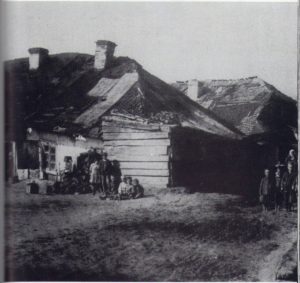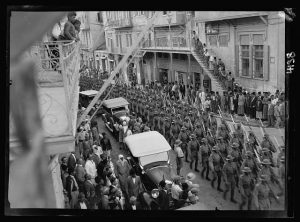The Wandering Jew Has Arrived
 Reviewed by Deborah Maccoby, Gefen Publishing House Ltd.Jerusalem, 2017
Reviewed by Deborah Maccoby, Gefen Publishing House Ltd.Jerusalem, 2017
first published in Paris, 930, as “Le Juif Errant Est Arrivé”
Albert Londres was a famous French investigative journalist — the model for Hergé’s intrepid cartoon reporter Tintin. France’s highest award for journalism is called the Albert Londres Prize. Londres travelled the world exposing suffering and persecution; he wrote “Our profession is not to give pleasure or to do harm; it is to twist the pen into the wound”.
In 1929, Londres decided to investigate the Jews. The book that resulted is still widely read in France but the one English translation in 1932 quickly went out of print. Now The Wandering Jew Has Arrived has been retranslated into English by an Israeli and published in Jerusalem.
Londres begins in England, land of the Balfour Declaration, but his interest is not in the settled Western Jews. He soon sets off to find the ghettoised, persecuted Jews of Eastern Europe — the Wandering Jews of sub-Carpathian Russia, Bessarabia, Romania, Czechoslovakia and Poland. We encounter their horrifying conditions – extreme poverty, freezing cold, famine and atrocities carried out by Cossacks during pogroms.
Londres’ depictions contradict the current tendency to see Zionism as solely a settler-colonial movement; they enable the modern reader to understand why Zionism was seen by its early adherents as a solution, especially because – as Londres writes in relation to Polish Jews — “the United States and Canada have just closed their doors to them. Argentina demands 150 dollars. France makes it difficult”.
But the deeply religious Eastern European Jews he meets are not interested in Zionism. Londres asks a rabbi from Galicia (Poland/Ukraine) who has come to the East End of London to collect funds for his starving people – what he thinks of the Balfour Declaration. The reply is: “Mr Balfour is a lord, not a messiah”. These rabbis and their disciples are waiting for the Messiah who is not the assimilated atheist Theodor Herzl either.
In Kishinev, Londres meets a young pioneer from Palestine, trying in vain to interest the rabbis in Zionism. The Zionist exclaims in frustration: “Whoever put the idea of the Messiah into their heads…..By dint of waiting for him, they will all end up slaughtered. They are like the inhabitants of Stromboli, waiting for the volcano to erupt!” To which Londres replies “you number fourteen million….you cannot all go and live in Palestine”.

Jewish shtetl, probably in what was Galicia on the north border of former Austria-Hungary
Londres admires the fearless bearing of the young Zionist which contrasts so strongly with that of the fearful East European Jews: “His chest is not slumped; he stands straight, with proud shoulders. As he crosses the streets, he does not cast his eyes warily in every direction or quicken his steps….”
He is critical of the Hassidic Jews’ submissiveness towards their Christian persecutors and their ruling rabbis yet also filled with awe at the reverence they give towards their sacred books, the Torah and the Talmud, the intricate rabbinical arguments over the correct interpretation of the Torah. This devotion reveals the secret of the survival of the Wandering Jew: the sacred books provide a home, a secure belonging of the mind. The Torah, says Londres “is their national flag, their patriotic hymn, their unknown soldier”. In a village synagogue — a wretched, broken-down shack — “the ecstatic gaze of those hollow Jews rose towards the Ark of the Torah. Of what import the misery of the dwelling? The treasure is up there!”
In Warsaw, Londres visits the Mesivta, the “great seminary of world Jewry”. Here 587 rabbinical students study “to the point of exhaustion, aberration and, one can even say without exaggeration, hallucination….it was not at all ridiculous, but very beautiful, moving, imbued with majesty and as respectable as madness”. It is made even more moving by our knowledge that in ten years this world will be annihilated.
Londres then embarks for Palestine, where he is enraptured by the new Jews of Zionism: “A revolution passed before my eyes. Where are my caftans, my beards, my sidelocks? Here are my Jews: heads uncovered, clean-shaven, with open collars, firm steps and chests raised high in the air…. From time to time, an extraordinary creature appears: a caftan, a beard, curls! As they pass him, the others discreetly shrug their shoulders. Who is this ghost?”
BUT FOR THE FIRST TIME the enmity of the Palestinian Arabs has been aroused against the Jews. They had not opposed the mainly religious refugees from Eastern Europe who, under the aegis of Baron Edmond de Rothschild, had established agricultural settlements within Ottoman Palestine. It was the Balfour Declaration that roused the anger of Palestinian Arabs because, as Londres points out, it reneged on Britain’s promise to the Arabs: “If victory [in the first world war] fell to the British, they promised to establish an Arab kingdom…victory came…the Arab kingdom vanished. Israel took its place.”
Londres however is on the side of “my Jews”. He rhapsodises over the achievements of the European Zionist pioneers in taming “the wild land”, as though the land was uncultivated before their arrival (the common European myth that has been exposed by modern scholars — for instance, Baruch Kimmerling and Joel S. Migdal in Palestinians: The Making of a People, Londres does not stop to find this out: “ Doctors, teachers, lawyers, painters, poets all set out to tame the wild land with pickaxes and shovels. While one should acknowledge that the Arabs inhabited this land for centuries, it should also be noted that they did not complete the work. They lived here in the way beautiful wild creatures inhabit the jungle”.

now revised and expanded as The Palestinian People; a history, Harvard University Press 2003
He devotes a chapter to the 1929 massacres of Jews in Safed and Hebron, carried out by Palestinians. Despite his colonial mind-set and strong bias towards the Jews, Londres is too clear-eyed an observer not to link these massacres to the Palestinian awareness that the goal of Political Zionism is to possess the whole land.
According to Londres the Zionist Jews had become arrogant and done “stupid things”. Muslims had made repairs to the wall and alley adjoining the Western Wall through which Arabs walked with their donkeys while Jews were praying. In retaliation, “Around four hundred Young Jews proudly made their way to the Wall” and “raised the blue-and-white flag, the new standard of the Land of Israel”. Londres calls this“the least diplomatic and most ill-advised act committed by the Jews since their return to Palestine… The impatience and pride of the young fellows handed the enemy the opportunity they were waiting for”.
This action took place – August 1929 – a month after the 16th Zionist Congress in Zurich, which, he writes, made clear the Zionist aim to gain “all of Palestine”. This triggered the riots that led to the Hebron and Safed massacres. o Londres it’s not the Zionist aim of gaining possession of the whole land that’s at fault, merely their manner of going about it: “Your old wanderer’s stick became haughty, like a halberd…. you let it drop coldly on the feet of the Arabs…What did your neighbour, the dear Arab, do?… He drew close, on tiptoe, and while you were vaunting your glory, he clobbered you in the neck”.

A display of British military force in response to the riots of summer 1929
The book ends with Londres watching Jews on Rosh Hashonah (the Jewish New Year) carrying out the symbolic custom of casting into the sea the dust and debris from their pockets. Londres comments: “As long as they do not forget to drown their excess pride, everything will end well”.
Which it has clearly not. Zionists have commonly displayed excess pride although the central reason for the failure of the dominant, nationalist form of Zionism is the drive to gain the whole land – a goal that Londres does not condemn.
The great irony of this book is that the ultra-religious Jews — Londres’ “ghost” of the ghetto past – nowadays set the agenda. Israel has become a ghetto state, immuring Jews and Palestinians inside a fortress wall and has produced a modern ghetto Jew, indifferent to the world beyond. The fundamentalist rabbis of the settlements believe the Messiah’s arrival is imminent. They abuse the treasured holy books in order to persecute in their turn.
A final note: Londres repeats the Zionist myth that the Romans expelled Jews from Palestine in 70CE after the destruction of the Temple. As Shlomo Sand points out in The Invention of the Jewish People, scholars have always known there was no expulsion; the Romans never deported whole peoples. The majority of Jews were already settled outside the Land of Israel by the first century CE and most of the Diaspora communities were made up of converts.
Londres shaped his book on the idea of the Wandering and Arrived Jew, perhaps a subconscious recall of antisemitic Christian ideas of Jews. He writes, in relation to the Christian persecution of Jews, “And so the new passion of the Jews began. The cross that they had hewed for Jesus began to hound them”.
It could be reformulated as “From the accursed, suffering Wandering Jew to the redeemed, forgiven Arrived Jew”.

Deborah describes this as her ‘mad aunt’ photo; the hostile blog Simply Jews posted it and wrote that if it makes you think of “one of these slightly demented aunts that are very good in making their own preserves or jams, overcook the roast and are afraid of spiders – perish the thought”. Such is the imagination of a Simply Jews blogger.
